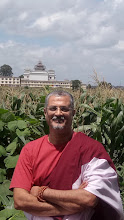Times of India (National), Pg 16, Editorial, 28.10.2011
Noble Cause And Effect
There’s no separating spirituality and politics when the aim is to serve the people
Girish Deshpande
During a stay at the Kharchhu monastery in Bhutan recently, i had the good fortune of getting a private audience with a revered master of Tibetan Buddhism, HH Namkhai Nyingpo Rinpoche. I posed to him a query, through an interpreter, about how he looked at politics as a way of serving people so as to improve their lives.
One was awestruck by the simplicity of his response. Any chosen path that alleviates the suffering of sentient beings, if taken up with an ethical motivation, is a noble path. Even if you were to bring true benefit to just one person other than yourself, that would be good enough. It is important to never give up, no matter the hardships on the chosen path.
With civil society’s agitation unfolding over the past few months and an unwilling government periodically playing hardball with a representation of a section of civil society on the issue of a strong anti-corruption law, one aspect has been baffling. It is the near-absence of people seeing the political content of this movement. Worse, though religious colours are being smeared on the movement, its spiritual aspect is unfortunately being clouded. And even if a few popular gurus are bringing in the spiritual content, they are apprehensive about giving the movement political status!
All kinds of names have been coined for the anti-corruption movement. People’s movement, social movement, second freedom struggle these are just some of them. To my mind, however, it is nothing but a political movement driven by the indefatigable spirit of the people. So, in effect, it becomes a politico-spiritual movement. This needs an explanation.
Whenever a reformer or group of reformers uses education to reform a thought process among a section of people, it is termed a social movement or social reform. Such leaders are called social reformers. Consider the brilliant examples of Raja Rammohun Roy’s abolition of child marriage and sati, women’s emancipation through education driven by Maharshi Karve, or any number of other successful social reformers with worthy initiatives to match.
However, when a section of the citizenry makes its government answerable, whether local or national, it is a political movement. Take the example of our very own movement for sovereign status, led by Mahatma Gandhi, where Indians demanded that the colonial powers answer their fundamental question: Why cant we be allowed to govern ourselves. Or, for that matter, consider Nelson Mandela’s antiapartheid movement in South Africa, Lech Walesa’s call for democracy in Poland, the Dalai Lama’s decades of engagement with China (until he recently gave up his role as the political head of the Tibetans to usher in democracy), Aung San Suu Kyi’s struggle in Myanmar and, more recently, the Middle East’s Jasmine revolution.
All these movements were and are fundamentally peoples’ movements. But specifically, as they have made or are making their governments answerable, they have a distinct political flavour that cannot be ignored. This argument should establish the essentially political content of many movements. It applies as well to the one India is currently witnessing: the government is being questioned by citizens on its lack of urgency in framing a strong anti-corruption Bill.
Now, any task that is undertaken with an ethically directed motivation and an intention singularly focussed on rendering service to others where the seeker chooses to pay or not pay for services so rendered, but willingly and happily seeks such service is also spiritual in content. All real dharma gurus, for example, who strive for the well-being of their followers, are engaged in enhancing and elevating the spiritual content in them.
We are well aware that religion has nothing to do with spirituality. It is at best a vehicle, if one chooses to mount it, available as an option. Religion, per se, can be safely parked aside. Teachings, though, are of importance. A spiritual person may not be religious and a religious person need not be spiritual.
In an anti-corruption movement, the spirit and energies of the people are directed towards a common cause: that of improving their own living conditions and of others through reduced corruption, which can lead to an improved quality of life for all. Such a movement has great spiritual merit and content.
One can infer that any activity or profession which bases true service on the pillars of ethics, truth and non-violence and aims at improving the quality of life of a larger section of people has spiritual content. Consequently, if politics were to be based on this principle of well-meaning service directed towards improving quality of life, it would have pure spiritual content as well. Therefore, in their pure conception, spirituality and politics are integrated in each other. Indeed, they are mutually inseparable.
There is compelling reason for any person true to his chosen spiritual path to not shy away from politics, but indeed to actively and positively engage with the political process on a continual basis. As a corollary, anyone in political service ought to be connected spiritually with himself to render such service. A great disservice would be done if each were to stay clear of the other.
The Mahatma, whom we all revere, said, “My brand of politics is based on truth, ethics and non-violence. It (politics) is an inextricable part of me”. This recalls Aristotle who in his wisdom told us: ‘A truly ethical life can only be lived by someone who participates in politics.’
The writer is a social activist
Monday, November 21, 2011
Subscribe to:
Post Comments (Atom)

No comments:
Post a Comment